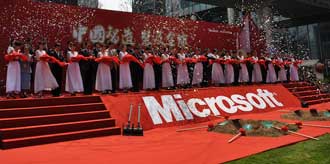 Software giant Microsoft is storing pots of cash away from the US government tax man.
Software giant Microsoft is storing pots of cash away from the US government tax man.
According to disclosures in the company’s most recent annual filings with the Securities and Exchange Commission Redmond is sitting on almost $29.6 billion it would owe in US tax collector if it bought $92.9 billion it has stored in its off-shore bank accounts.
The cash would amount to almost the entire two-year operating budget of the company’s home state of Washington.
Microsoft insists that it is not avoiding tax and that the money it keeps out of the US is “reinvested outside the US.
However, it does look more as if the company is using tax shelters to dodge the taxes it owes as a company domiciled in the United States.
Microsoft’s SEC filing is turning up just when the US government is under pressure to do something about the fairness of U.S.-based multinational corporations using offshore subsidiaries and so-called “inversions” to avoid paying American taxes. Such manoeuvres although often legal threaten to reduce US corporate tax receipts during an era marked by government budget deficits. However if US politicians do anything about it, they are almost certain to lose all their campaign contributions from big corporates.



















